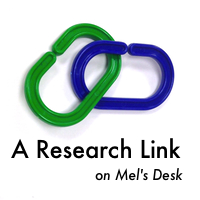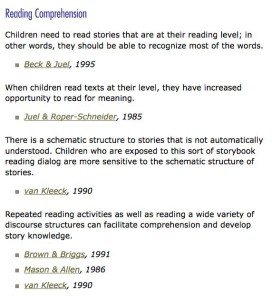
Well, today actually it’s lots of links!
On last month’s Research Link post, Brytani commented, “Do you search databases for this information or are you subscribed to journals?” Which I thought was serendipitous because just a few days before I had brainstormed a bunch of post ideas and one of them was to share some of the sources I rely on for learning the crunchy researchy bits.
These are also some of the starting points I used to gather the information I shared as my part of our recent ALSC Institute session, “Thinking Outside the Storytime Box: Building Your Preschool Programming Repertoire.” During the presentation, Amy C, Amy K, and Marge showcased some of their favorite literacy-based programs, then I got to jump in and provide a little bit of rationale for each one, showing how they connected to the ECRR six skills and five practices, and pointing to relevant research and articles. (Slides & handout for the session at the linked title; links to blog posts about the ALSC Institute at each name.)
So, these are just a few of my go-to spots. I am 9 million percent positive there are more, and I hope you share yours in the comments!
Bookmark These Sites
These are the two sites that really got me going when I first started reading more deeply about early literacy 5-6 years ago. They are both great pointers to further research, and I return to them again and again when I begin to pursue a new train of thought.
CELL
Center for Early Literacy Learning
CELL is an initiative of the Center for Evidence-Based Practices at the Orelena Hawks Puckett Institute, ultimately funded by the US Dept of Education. They are focused on putting research into practice, so they have a number of resources, including CELLreviews, which are overviews of a research topic, and Parent Practice Guides, which are super handouts for parents and caregivers. Spend a little time here!
SEDL is a nonprofit education research organization; the tagline on their website is, “Advancing Research, Improving Education.” This is an enormous site and to tell you the truth I haven’t investigated any of it except for one tiny slice. In 2000, SEDL published Cognitive Foundations of Learning to Read: A Framework, which is a summary of relevant research on how children learn to read. The framework is in turn supported by a list of the research evidence used to develop it. (If you take a look at the framework graphic, you will see the dual decoding/comprehension aspects of learning to read that are reflected in ECRR2.)
Now, what I love about this list of research is how it is presented:
The findings are written out in very readable summaries, with the relevant studies listed below.
What I like about this is three things! It’s a nice long list of research (this is just a tiny screen cap); it’s super easy to learn things just reading through the list itself; AND you don’t have to agree or disagree with how the framework is constructed–you can just start here and begin reading on your own.
Just remember that the list isn’t current, since it is a bibliography of the research that was used to construct the framework 15 years ago. However, it’s been a valuable place to start.
Newsletters
These are a few of the newsletters, blogs, or sites that I have subscriptions to, are in my reader, or are bookmarked. This does NOT mean I read them all the time–I wish I could. But I do glance at headlines, and save stuff to read later, or come back to these sites to do more strategic searching when I’m trying to learn something specific.
Harvard Family Research Project newsletters and Harvard’s Center on the Developing Child newsletter
Breadcrumb Trails
I also like to start with a nice overview article from a resource like NAEYC, and track down any studies that are cited at the end. THOSE studies will have citations to follow as well, but often what I read them for is the literature reviews sections. I find these sections are really fruitful reading in themselves, because that’s where the study authors put their own research in context of everyone else’s research.
Now I know lots of you are experienced researchers and are familiar with research studies and abstracts and lit reviews. However, not everyone is! If you are one of those someones who has been busy doing other fabulousnesses and hasn’t done a lot of this type of reading yet, the literature review of a research paper is where the authors say, “So, Colonel Mustard has studied candlesticks in the conservatory and found out this, and Miss Scarlet has studied ropes in the ballroom and found out that, but we’re really curious about candlesticks in the ballroom because reasons.” It’s a good way to start to get a feel for an area of study, because you will find quick summaries of related research all together in a few paragraphs. Then lots of times I skim or skip the research methods and stats, then read the findings and implications sections at the end. Ta-dah!
Surf and Search
The other thing I like to do is to take of the little tips or factoids that I’ve heard in presentations or at conferences or from other librarians, and try to track down if there is a single study or thread of research behind it. Our joint quest to find the stats behind the Mem Fox nursery rhyme quote is an example, or when I tried to find an article that talked about why fingerplays are good for building fine motor skills.
This is just basic librarianing–I start by searching a phrase or idea or question, then look for enough hints (names, proper search terms, journal titles) to try a more targeted search in Google Scholar or ERIC. Or I start in EBSCO’s Academic Search Complete, or Wilson or Library Literature, or ERIC, and noodle around with keyword searches. Sometimes I find stuff, sometimes I don’t! I must admit I don’t dig especially deep when I’m doing this, partly because I don’t have time to be more exhaustive and partly because I’m looking for the studies that have become more established wisdom and are cited the most. Also, even when I don’t find research-based findings, I often DO find professional blogs outside of the library world, which are valuable in and of themselves.
So, these are sources and methods I use most often. What have I missed? What do you love?



.jpg)
